Hall of Fame Inductees Address Next Generation of Activists
September 30, 2018
From a Rolling Stone senior writer to the founder of the Center for Environmental Health, the most recent inductees of the Shaker Heights Alumni Association Hall of Fame demonstrate the wide potential Shaker graduates exhibit. At an annual assembly for juniors and seniors Sept. 28, inductees encouraged students to pursue their passions, embrace opportunities and be advocates for change. They explained how their high school experiences influenced them, and highlighted how the divisive politics of the 1970s mirror the current political climate.
Ellie Vahey
Dr. Abby Abelson, 1970
“I really didn’t think I could do it. I really didn’t think I could do pre-med, and I saw a lot of the people who were doing it and I was very intimidated,” Dr. Abby Abelson said.
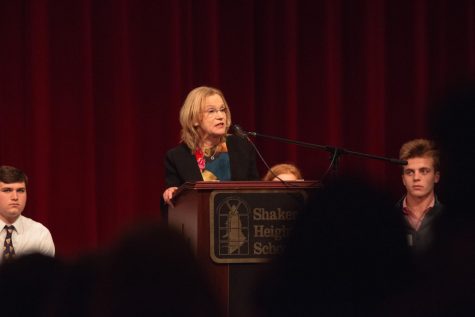
She’s now the Cleveland Clinic’s department chairwoman of immunologic and rheumatic diseases, and the President of Rheumatology Research Foundation, the largest private funder of rheumatology research in the United States.
“I then went back said, you know what? What I really want to do is be a physician. I love being able to take care of patients and being able to learn new science everyday,” Abelson said. “[Shaker] gave me the confidence to embrace things that might not have been easy, because the environment was so supportive.”
Rheumatology is the study of rheumatic diseases which often cause pain the joints and/or connective tissue. Common rheumatic diseases include arthritis, osteoporosis, and neck and back pain.
Abelson said that helping her patients was the most rewarding part of her job, “That’s the wonderful thing about medicine, is that your really able to help people and become a part of their lives while still being able to still do something very intellectually stimulating.”
She described the political climate during her time in high school as turbulent and tense, including assassinations of national leaders and the Vietnam War.
Abelson said, “Shaker students, your voice matters, and I know that you can rely on the strength of this community and the education provided here as you contribute to making the world a better place — for all of us.”
Ashley Sah
Michael Green, 1980
“I was 7 years old when the Cuyahoga River caught on fire. I remember looking at the sunset and seeing all of the smoke,” said one of Shaker Heights High School’s newest hall of fame inductees, Michael Green.
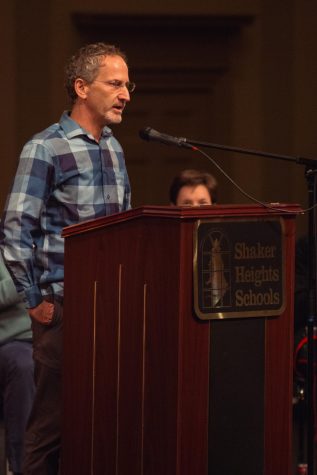
Green is the Chief Executive Officer and founder of the Center for Environmental Health, which aims to change corporate behavior in order to protect people from illnesses related to pollution in the air, water, products and food. He graduated in 1980 and has devoted his life after high school to environmental studies and advocacy. He graduated from University of Michigan with a masters in public policy and M.S. in natural resources.
From working at the U.S. Department of Energy Office or Environmental Management and the Environmental Protection Agency to creating a solid waste management plan for refugee communities in India, Green has brought his experience to bear around the world.
The agency Green currently works for recently sued JUUL. “We sued JUUL. They are trying to get you addicted to something that causes cancer. That’s their business model,” he said.
Green said that environmental problems create inequality. “So, where is the pollution the worst, who is the most affected by those things? It’s low-income communities of color that are the most affected,” he said. “In my work, I get to work with the leaders of these communities a lot.”
Green’s Shaker background compelled him to fight inequality in his field.
During his speech Green asked students to figure out what really mattered to them and do something about it. “Think about something that you care about. Turn to the person next to you and in three seconds tell them what it is,” he said, “Do something about it today.”
Ainsley Snyder and Lauren Shepard
David A. Hansell, 1971
“I’ve always tried to use my career to think of ways to make the world a better place for other people. And so I get to do that for child welfare, making sure kids have the opportunities so they can thrive.”
David A. Hansell said apathy alone does not yield change, but action does. His work in health and social services policy reflect this belief.
“When I think back to my high school years I see strong parallels between those times and these,” said Hansell, who was a high school junior during the Kent State shooting of 1970, when four protesting students were killed by the National Guard.
“So what does all of this have to do with Shaker?” Hansell urged students to use their educations by championing worthy causes.
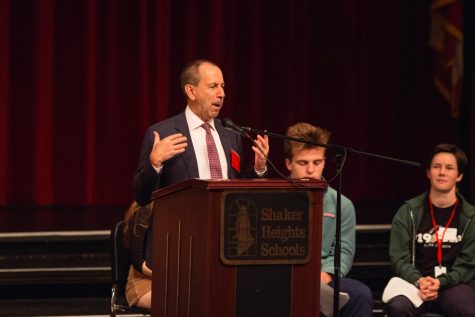
Hansell said gaining historical and political understanding are crucial to grasping the roots of current conflicts. Furthermore, students have a responsibility to use their knowledge to positively affect society.
Hansell was appointed Commissioner of the NYC Administration for Children’s Services in February 2017. His advocacy stems from the values his parents instilled in him.
“I was really inspired by my parents. My dad was a lawyer who did a lot of civil rights work. My mom was a social worker,” Hansell said. “And they taught me that especially when you have a lot of opportunities in your life, because of your background and your family and your education and where you live, you also have an obligation to use that to enable other people to have similar things.”
After graduating from Shaker, Hansell pursued his education at Haverford College and Yale Law School. He said growing up in Shaker shaped him.
“My work I do now is mostly with children and adolescents, so I think a lot about what helps people to become healthy adults: What kind of experiences people need, what kind of education they need and what kind of opportunities they need,” he said. “Being inducted makes me think of how lucky I was coming from Shaker and how I got so many experiences that so many other kids don’t get.”
Ellie Vahey
Judy Harris, 1966
Judy Harris, class of ‘67 spoke on the power of perseverance, sharing her own story of determination. “Figure out what you think you want, and don’t let anything stand in your way,” Harris said.
For as long as Harris could remember, her heart was set on a single school. During the summer of 1965, Harris applied to only one college: the University of Michigan.
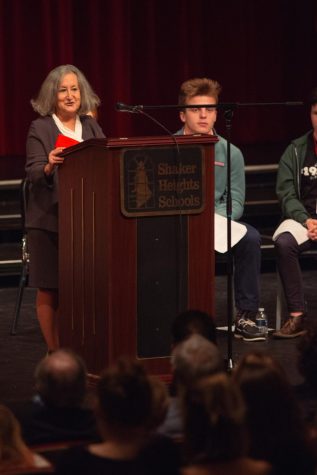
“I knew what I wanted,” Harris said. She suffered a devastating surprise however, when she was waitlisted. “Being put on the waiting list at Michigan was no better than being turned down,” she said.
However, Harris was not easily phased. “I did the only thing I could think of to do that time, I headed downtown to the Greyhound bus station, and I caught the first bus to Detroit,” said Harris. After the eight and a half hour bus ride, she took another mode of transport to Ann Arbor, and made her way to the dean’s office of the University of Michigan.
“Once there, I explained to the receptionist that, no, I didn’t have an appointment, but I was perfectly content to wait for the rest of the day — or the rest of my life — until the dean could see me,” said Harris.
At around 6:30 p.m., the dean packed up his belongings to go home. Harris informed the dean of her journey to his office, and he consented to a meeting.
Harris said she does not remember what she said to the dean during the meeting, but she assumes that the dean was impressed by her devotion and passion. “All I know is that he buzzed the woman at the reception desk, asked her to come into his office, and he dictated an acceptance letter right there,” said Harris.
Harris’ unwilting persistence and self-advocacy proved crucial to her accomplishments. She attended Yale Law School and became a member of the Senior Counsel at the Reed Smith law firm. Nothing deterred Harris’ pursuit to success, and she does not want anyone to be deterred from their goals and aspirations.
Harris said, “I felt my whole life was about proving you could have it all.”
Bailey Pasternak
Aaron David Miller, 1967
“Connect your accomplishments to a broader purpose – a common good – to work and strive on behalf of others.”
Aaron David Miller, class of ‘67, who served as a State Department analyst and as an analyst and negotiator for Middle Eastern issues for both Republican and Democratic Secretaries of State, found that the most important lesson he gained from high school was learning to structure arguments and create common ground.
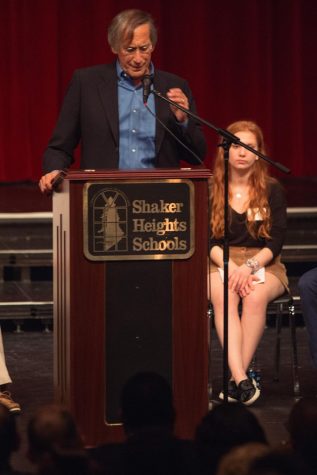
Although he admits he was little more than a tennis player at the high school, Miller said the recognition of being inducted to a high school’s hall of fame was one of his mother’s greatest accomplishments, and now, one of his too. “I think she understood intuitively the importance of the high school,” Miller said. For him, Shaker “provided an incredible foundation for my judgment, not just to prepare me for college,” but to prepare him for life.
He gave students three pieces of advice: to look for bipartisan consensus to make change in a polarized America, to listen to another person’s argument to see their viewpoint and find common ground, and to “turn the damn ‘m’ in me upside down so it becomes the ‘w’ in we.”
Miller finds this advice to be important because both sides of an argument are valid, and the question for the negotiator is to find common ground.
The best part of his job now is to try to get people to look at the reality of foreign policy and and to think critically, which is stressed in his column “Reality Check,” found in Foreign Policy Magazine.
Miller said, “At the end of the day, the most important question that you should ask yourself, ‘Being in this world, did I make it better?’ ”
Hilary Shakelton
Kathy Roth-Douquet, 1982
“I’m not rich and I’m not famous, but I am lucky,” Roth-Douquet said.
Kathy Roth-Douquet (‘82) is a writer, lawyer, political activist and Marine Corps wife. Currently, she is the CEO of Blue Star Families, the largest chapter-based nonprofit organization serving active duty of all branches.
On 9/11 the world changed for Roth-Douquet. “I lived on military bases and helped our country fight a war for 17 years until my husband retired a few years ago,” she said.
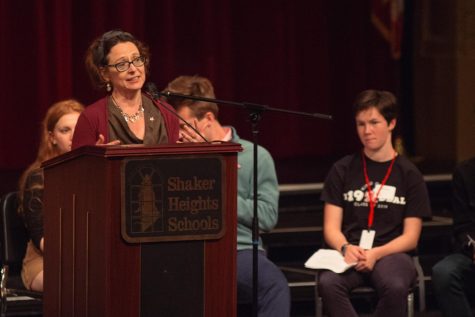
“At one point, we moved 16 times in 10 years, and we lived in three continents, four countries, and five states.”
During those 17 years, Roth-Douquet said she sometimes felt lonely and frightened. However, she decided to embraced the hardship. “It’s not supposed to be smooth. There are supposed to be bumps.”
Roth-Douquet said her biggest success is being able to improve the lives of others. Over one million people have used the program and resources Blue Star Families offers. “We need our military and they are volunteers. They are serving with families and if their lives are too difficult, they can’t keep doing that work.”
At Shaker, Roth-Douquet learned the importance of following through with certain initiatives.
Attending Shaker helped her learn about acceptance and finding common ground with others. “Diversity of friendships at Shaker has normalized difference for me. That’s what Shaker does,” she said. “When you normalize difference, that means that any room you walk into and be comfortable.”
Danielle Krantz and Ana Butze
Jamil Smith, 1993
“Trying things — even having interesting failures — taught me a lot about not just life, but how to be a writer.”
Jamil Smith (’93) is a senior political writer for Rolling Stone, a columnist for HuffPost and a contributing opinion writer for the Los Angeles Times.
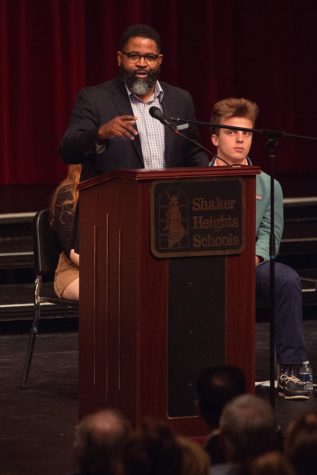
“I try to make sure that I am adding to the story in a healthy way,” Smith told students about opinion writing at a roundtable discussion in Room 231 after the annual Shaker Heights High School Alumni Hall of Fame assembly.
The round table conversations were created last year by Holly Coughlin, the executive director of the Shaker Schools Foundation. In the discussions, the inductees answered students’ questions about their careers.
En route to Rolling Stone, Smith worked for MSNBC, CNN and HBO; as a producer at NFL Films and a senior editor with the New Republic. Smith wrote the February Time magazine cover story about the cultural significance of the movie “Black Panther.”
“All these different experiences added some depth and color to what I could now put on the page,” Smith said.
In his assembly remarks, Smith encouraged students to keep trying.
“What I want to do is let you know to try things,” Smith said. “To try different things, to not be afraid to fail, not be afraid to have interesting failures. To embrace those, to learn from everything around you, to go on every interview you can possible go on.”
Smith said he learned these lessons from his experiences and activities at the high school as a news editor on the Shakerite and one of the first MAC scholars.
“You are on an incredible launching pad right now. Take advantage of it, use your time here productively, and go on and try things,” Smith said.
Smith said that in high school he had lots of ideas, but did not fully know what he wanted to do in his adult life.
“I now know exactly what I want to do and I’m doing it,” Smith said. “It doesn’t matter how long that process takes; just make sure that you are doing something you are passionate about and that you are adding something of value to the world.”
Madeline Price
Abdul Williams, 1990
Abdul Williams (’90) is a screenwriter and won the 2018 NAACP Image Award for outstanding writing for “The New Edition Story”(2017). His latest project is “The Bobby Brown Story” which premiered earlier in September.
At the high school, Williams said he thrived in the theatre department and that his experiences at the high school taught him how to think and interact with different kinds of people.
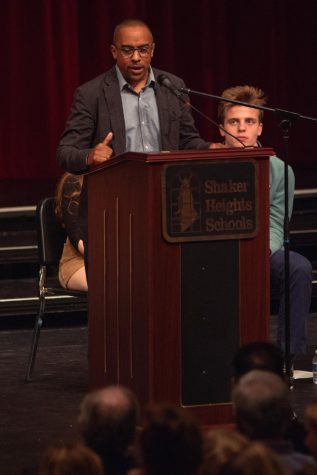
“We get such a good rock solid foundation here,” he said. “You realize a lot more when you leave how prepared you are, how diverse this school is, how interacting with people of your strata of society and culture — it gives you a suit of armor when you go out into the world.”
During the assembly, Williams explained how a friend he really admired brought him into theater at a time in his life where he really needed it. He grew up as one of the first African-American students at Lomond, and while he was a student in the district, he experienced grief from his grades, letting his mom down while she worked so hard to ensure his Shaker education. He advised students to be aware that they could be inspiring someone and that “you could be changing their life.”
When determining future life paths, Williams suggested that students try many different opportunities. He explained that it is important not to be scared to try new things.
“I had to try a few things first to find out what I didn’t like. Sometimes that’s just as important as finding out what you are passionate about,” he said.
Regarding his induction, Williams said, “I’m very proud to come from Shaker. It means everything.”
Bess von der Heydt
